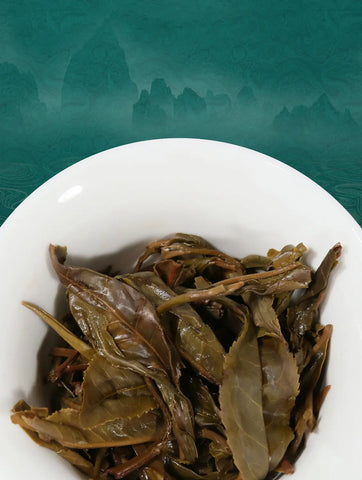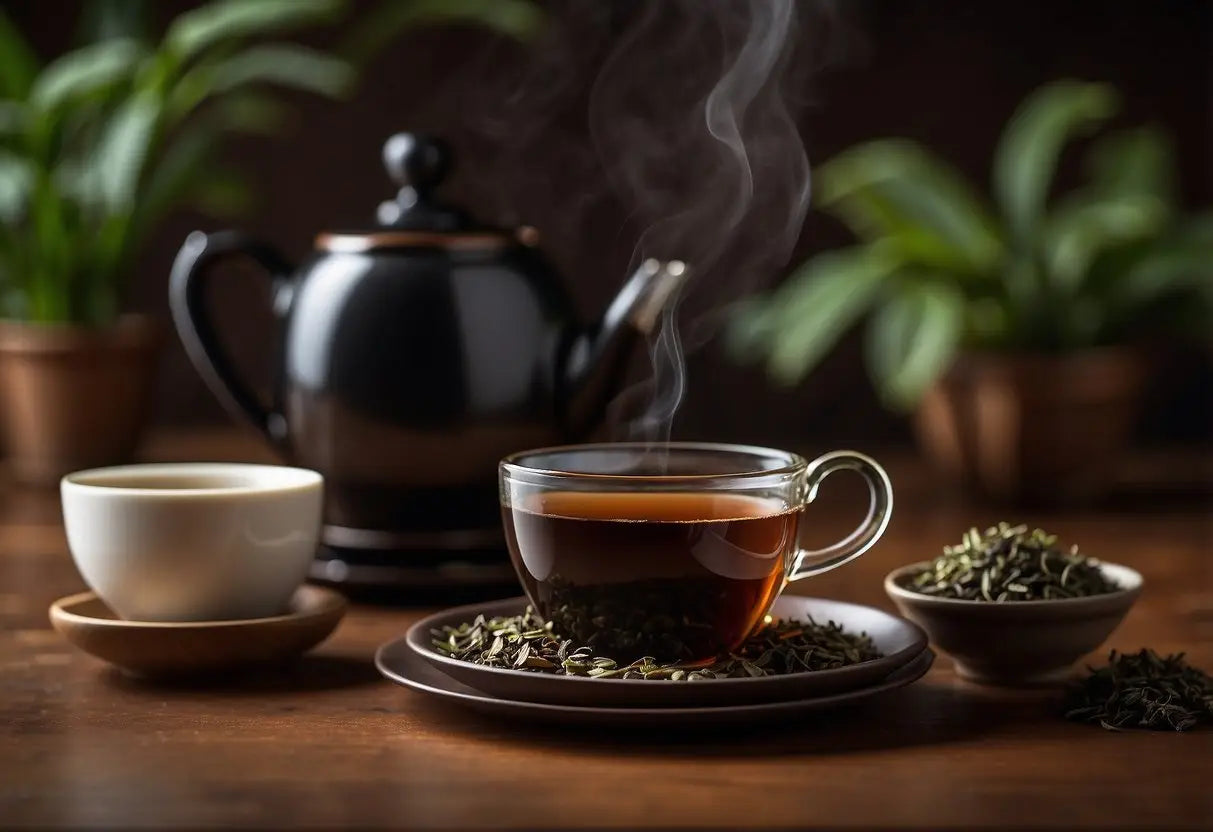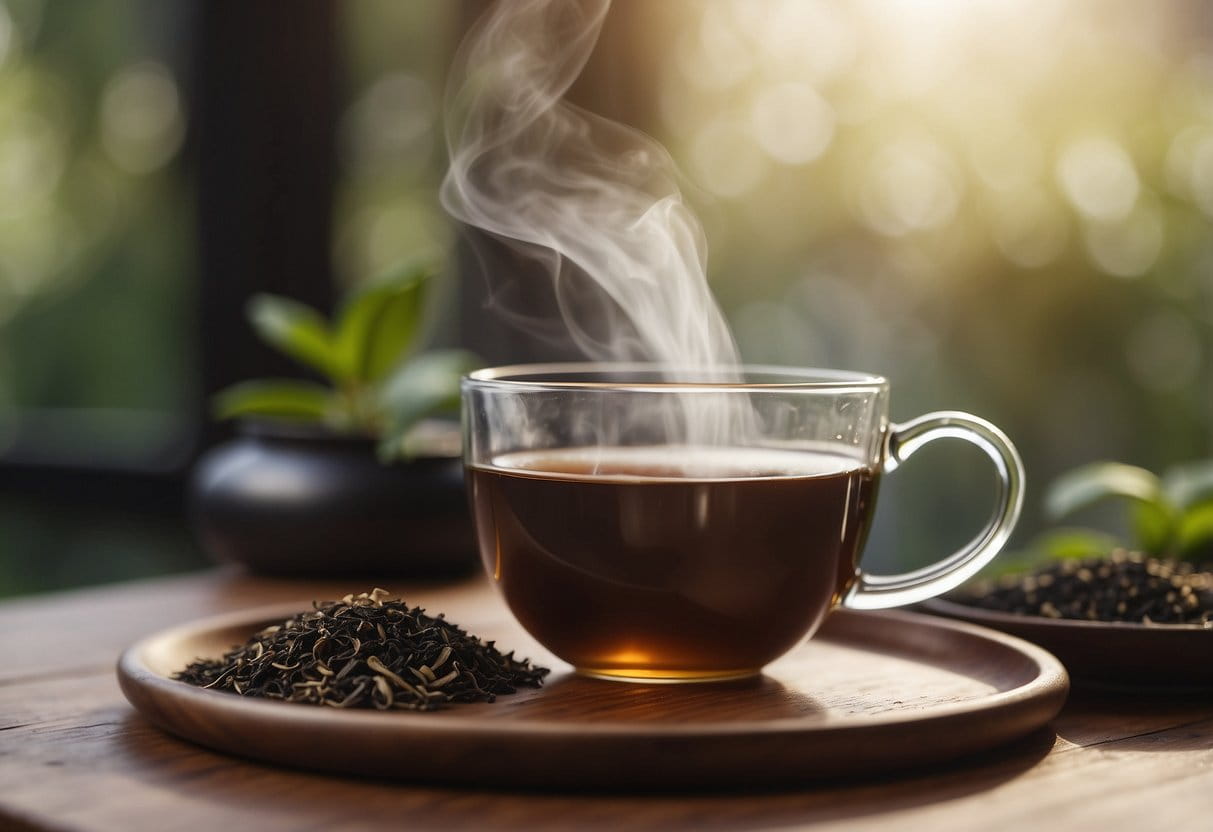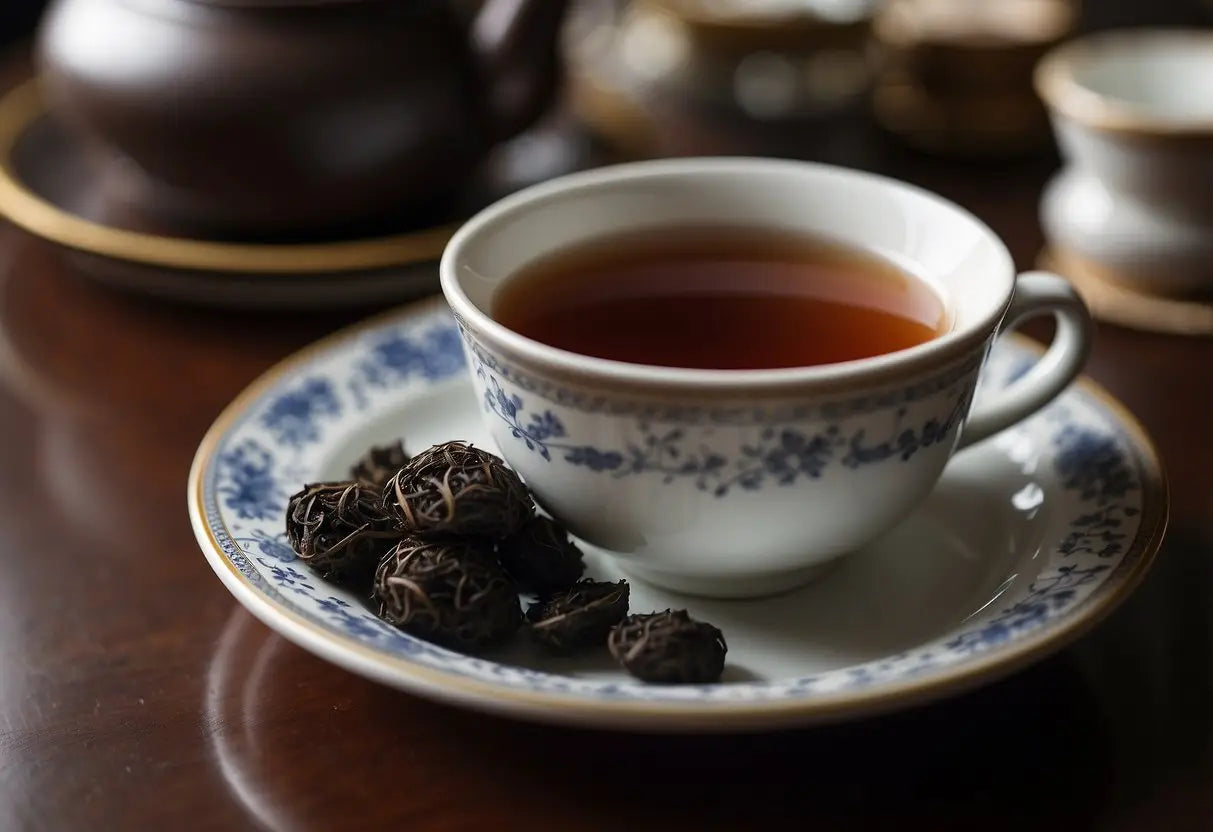Pu Erh Tea Side Effects
Shop our Pu Erh Tea collections!
Pu-erh tea, a traditional Chinese tea, is known for its unique fermentation process. This distinguishes it from other teas like green or black tea.
There are two main types: raw (sheng) and ripe (shou) pu-erh tea. Raw pu-erh is aged naturally, which can take years. Ripe pu-erh undergoes a fermentation process to accelerate aging.
Bestsellers
Key Characteristics:
- Flavor: Earthy and robust for ripe, fresh and floral for raw
- Aging Process: Years for raw, months for ripe
- Color: Deep red-brown for ripe, greenish-yellow for raw
Benefits of pu-erh tea may include:
- Digestive Aid: Often consumed after meals to aid digestion
- Energy Boost: Contains caffeine for a moderate energy lift
Pu-erh tea is best stored in a cool, dry place. Avoid exposing it to strong odors or direct sunlight, as these can affect the flavor.
Brewing Tips:
- Water Temperature: Use boiling water.
- Steeping Time: Usually 2-4 minutes.
- Re-steeping: Can be steeped multiple times, with flavor improving over several steeps.
Enjoy experimenting with different grades and vintages. Be mindful of its caffeine content if you are sensitive to stimulants.
Common Side Effects of Pu-erh Tea

Caffeine-Related Issues
Pu-erh tea contains caffeine. You may experience insomnia, jitters, or increased heart rate if you consume it in large amounts.
Digestive Discomfort
Some people report digestive issues like stomachache or diarrhea after drinking pu-erh tea. These effects can vary based on your individual sensitivity and the amount consumed.
Allergic Reactions
In rare cases, you might experience allergic reactions. Symptoms can include rash, itchiness, or swelling. If this happens, stop drinking the tea and consult a doctor.
Drug Interactions
Pu-erh tea may interact with certain medications. If you are taking blood thinners or other specific drugs, consult your healthcare provider before consuming.
Iron Absorption
Tannins in pu-erh tea can interfere with iron absorption. If you are anemic or have low iron levels, you might need to limit your intake. Drinking the tea between meals might reduce this effect.
Bone Health Concerns
Long-term excessive consumption may affect bone health due to fluoride content. This is particularly a concern if your diet already has high fluoride levels. Monitoring your intake is advisable.
Caffeine Content in Pu-erh Tea

The caffeine content in Pu-erh tea can have notable effects on your sleep patterns and heart rhythm. It's essential to understand these impacts to enjoy your tea responsibly.
Lao Ban Zhang
Sleep Disturbances
Caffeine is a natural stimulant that can interfere with your sleep cycle. Drinking Pu-erh tea, especially in the evening, can make it harder for you to fall asleep. This is because caffeine blocks adenosine, a chemical that promotes sleep.
Even small amounts of caffeine can lead to insomnia or reduced sleep quality. If you are sensitive to caffeine, you might experience these effects more intensely. Consuming Pu-erh tea several hours before bedtime is a good practice to avoid sleep disruptions.
Heartbeat Irregularities
Pu-erh tea contains enough caffeine to potentially affect your heart rate. Caffeine can lead to palpitations or irregular heartbeats, especially if consumed in large quantities.
If you have a history of heart issues, you should monitor your intake. The stimulant effect of caffeine increases adrenaline production, which can elevate your heart rate. Drinking moderate amounts and spreading out your tea consumption can minimize the risk of heartbeat irregularities. Always consult your healthcare provider if heart issues arise after drinking Pu-erh tea.
Digestive System Reactions

Consuming Pu Erh tea can lead to certain digestive system reactions. Notable issues include nausea, vomiting, and acid reflux.
Nausea and Vomiting
You may experience nausea and vomiting after drinking Pu Erh tea. This is more likely if you consume it on an empty stomach. The tea's high tannin content can cause stomach irritation. Tannins are natural compounds found in tea leaves that can increase stomach discomfort. Frequent consumption might exacerbate these symptoms. Avoid drinking it in large quantities to minimize the risk. If nausea or vomiting persists, consult a healthcare professional.
Acid Reflux
Acid reflux can also be a side effect of drinking Pu Erh tea. The caffeine and acidity in the tea may trigger acid reflux symptoms, such as heartburn or indigestion. If you are prone to acid reflux, drinking this tea may worsen the condition. Opting for a lower caffeine version might help mitigate these effects. Limiting intake or pairing the tea with food can reduce the likelihood of experiencing acid reflux.
Allergic Reactions to Pu-erh Tea
Some people may experience allergic reactions to Pu-erh tea. Common symptoms can include skin rashes, itching, or hives. These reactions are usually mild.
If you notice more severe symptoms like difficulty breathing, swelling, or dizziness after consuming Pu-erh tea, seek medical help immediately. Severe allergic reactions require prompt attention.
People with allergies to other types of tea, such as green or black tea, may also be at risk. It's a good idea to start with a small amount to see how your body reacts.
Ingredients in Pu-erh tea can sometimes interact with medications, potentially leading to allergic reactions. Always consult with your healthcare provider if you're on medication.
Allergic reactions can vary from person to person. If you are unsure about your sensitivity, consider speaking with an allergist.
Pu-erh Tea and Dehydration

Pu-erh tea, like many other caffeinated beverages, has diuretic properties. This means it can increase urine production and potentially lead to dehydration if consumed in large quantities.
When you drink pu-erh tea, the caffeine content stimulates your kidneys. This causes them to excrete more salt and water, which can reduce your body's fluid levels.
To stay hydrated, you should balance pu-erh tea intake with water consumption. Here's a simple guideline:
- Drink 1 cup of water for every 1-2 cups of pu-erh tea.
Effects of dehydration include:
- Dry mouth
- Thirst
- Fatigue
- Dizziness
Excessive dehydration can lead to more serious health issues, so paying attention to your body's signals is crucial. If you feel excessively thirsty or notice signs of dehydration, reduce your intake of pu-erh tea and increase your water consumption.
Be aware of your total daily caffeine intake as it can compound the diuretic effect. Limit your pu-erh tea consumption if you consume other caffeinated beverages.
Tips for avoiding dehydration:
- Monitor your urine color; pale yellow suggests proper hydration.
- Alternate tea with water throughout the day.
- Increase water intake during hot weather or physical activity.
By following these guidelines, you can enjoy pu-erh tea without experiencing dehydration.
Impact on Iron Absorption
Pu-erh tea can affect iron absorption in your body. The compounds in pu-erh tea bind with non-heme iron, reducing the amount of iron your body can absorb from plant-based foods.
Drinking pu-erh tea with meals might not be ideal if you have iron deficiency. It's better to consume it between meals to avoid interfering with iron uptake.
For those taking iron supplements, it's advisable to wait at least an hour after your dose before drinking pu-erh tea. This precaution helps maximize the effectiveness of your iron supplementation.
Drug Interactions and Pu-erh Tea
While Pu-erh tea offers various health benefits, it's essential to be aware of potential drug interactions. Consuming Pu-erh tea can affect the absorption and effectiveness of certain medications.
Anticoagulants
Pu-erh tea contains vitamin K. This vitamin can interfere with anticoagulant medications like warfarin, potentially reducing their efficacy.
Stimulants
Caffeine in Pu-erh tea can increase the stimulating effects of certain drugs. If you are on medications such as amphetamines or other central nervous system stimulants, consuming Pu-erh tea might amplify their effects.
Antibiotics
Some antibiotics, particularly quinolones, can interact with caffeine. This interaction might cause increased side effects, as Pu-erh tea can slow down the body's ability to break down caffeine.
| Medication Type | Possible Interaction |
|---|---|
| Anticoagulants (e.g., warfarin) | Decreased efficacy due to vitamin K |
| Stimulants (e.g., amphetamines) | Enhanced stimulant effects |
| Antibiotics (e.g., quinolones) | Increased side effects |
Taking these interactions into account is crucial. Consult your healthcare provider for personalized advice.
Pu-erh Tea During Pregnancy and Breastfeeding
It's essential to be cautious about your caffeine intake during pregnancy and breastfeeding. Pu-erh tea contains caffeine, though typically less than coffee.
Caffeine and Pregnancy:
- High caffeine intake can increase the risk of miscarriage and low birth weight.
- Most health professionals recommend limiting caffeine intake to 200 mg per day.
Caffeine Content in Pu-erh Tea:
- One cup of pu-erh tea generally contains 30-70 mg of caffeine.
- This makes it safer than some other caffeinated beverages, but moderation is key.
Potential Benefits:
- Pu-erh tea may aid digestion and reduce bloating, which are common issues during pregnancy.
- It has antioxidant properties that can be beneficial for overall health.
Possible Risks:
- Though rare, high quantities of pu-erh tea might lead to increased heart rate and blood pressure.
- Pay attention to your body’s response and consult with your healthcare provider.
Consider these points and always consult with your healthcare provider before making dietary changes during pregnancy and breastfeeding. Maintaining a balanced approach ensures the well-being of both you and your baby.
Overconsumption Risks of Pu-erh Tea

Drinking too much Pu-erh tea can lead to several health issues.
Caffeine Effects
Pu-erh tea contains caffeine, which can lead to insomnia, anxiety, and jitters if consumed in excess. Those sensitive to caffeine should moderate their intake.
Digestive Issues
Overconsumption can cause digestive problems such as bloating, gas, and stomach cramps. Drinking large amounts might lead to discomfort and gastrointestinal distress.
Nutrient Absorption
Excessive consumption may interfere with the absorption of nutrients, particularly iron. This can be problematic for individuals with anemia or those at risk of iron deficiency.
Bone Health
High amounts of caffeine can affect your calcium balance, potentially leading to bone weakening over time. It is important to monitor tea intake to protect your skeletal system.
Blood Pressure
Consuming too much Pu-erh tea could raise your blood pressure due to its caffeine content. People with high blood pressure should be cautious and consult their healthcare providers.
Drug Interactions
Pu-erh tea may interact with medications, affecting their efficacy. If you are on medication, it’s advisable to consult a healthcare professional before increasing consumption.
← Older post Newer post →











